Table of Contents
Daily Current Affairs for Government Exams:
Today Current Affairs:20th March 2020 for UPSC IAS exams, State PSC exams, SSC CGL, State SSC, RRB, Railways, Banking Exam & IBPS, etc
Contents:
- Committee to review the fiscal consolidation roadmap of the general government.:
- Prime Minister’s 15 Point Programme:
- Light Machine Guns (LMG)
- CbC report
- Institute of Teaching and Research in Ayurveda Bill
- Small Farmers’ Agri-Business Consortium (SFAC):
- School Health Programme:
- National Disaster Response Force
- World Sparrow Day
- Janta Curfew on Sunday, March 22
- Huntington Disease
- National Policy on Skill Development:
- other important current affairs
1. Committee to review the fiscal consolidation roadmap of the general government.:
The Chairman of the Fifteenth Finance Commission has constituted a Committee to review the fiscal consolidation roadmap of the general government.
- The Committee will be chaired by Chairman N. K. Singh.
The Terms of Reference of the Committee are –
- make recommendations on the definition of deficit and debt for the Central government, overall states, the General Government and public sector enterprises.
- lay down the principles for arriving at the debt of the general government debt and consolidated public sector with appropriate netting to avoid double-counting.
- define contingent liabilities, provide quantifiable measures of such liabilities, wherever possible, and specify conditions under which “contingent” liabilities become “explicit” liabilities of the public sector.
- recommend a debt and fiscal consolidation roadmap for FY21-FY25 for the Central Government, overall States, and General Government and attempt building up scenarios for public sector enterprises.
2.Prime Minister’s 15 Point Programme:

Recently, the Union Minister of Minority Affairs shared information about the Prime Minister’s New 15 Point Programme for the Welfare of Minorities (PM’s New 15 PP), in the Lok Sabha.
- PM’s New 15 PP is an overarching program covering various schemes/initiatives of the participating Ministries/Departments and is implemented throughout the country.
Aim:
- To ensure that the benefits of various government schemes for the underprivileged reach the disadvantaged sections of the minority communities.
- It also provides that, wherever possible, 15% of targets and outlays under various schemes should be earmarked for minorities.
The performance of schemes/initiatives is continuously evaluated by the concerned Ministries/Departments.
In the context of the PM’s New 15 PP, the Substantial minority population, has been used for the identification of districts that are relatively backward.
- Districts with at least 25% of the total population belonging to minority communities have been identified as the Minority Concentration Districts (MCDs)
- The program has four objectives further divided into focus areas with schemes under them. These are as follows:
A. Enhancing Opportunities for Education
- 1. Equitable availability of Integrated Child Development Services (ICDS) Services
- 2. Improving access to School Education
- a. Sarva Shiksha Abhiyan.
- b. Kasturba Gandhi Balika Vidyalaya Scheme, etc.
- 3. Greater resources for teaching Urdu by Central assistance for recruitment and posting of Urdu language teachers.
- 4. Modernizing Madarsa Education
- a. Central Plan Scheme of Area Intensive and Madarsa Modernization Programme.
- 5. Scholarships for meritorious students from minority communities.
- 6. Improving educational infrastructure through the Maulana Azad Education Foundation.
B. Equitable Share in Economic Activities and Employment
- 7. Self-Employment and Wage Employment for the poor
- a. Swarnjayanti Gram Swarojgar Yojana (SGSY).
- b. Swarn Jayanti Shahari Rojgar Yojana (SJSRY).
- c. Sampurna Grameen Rozgar Yojana (SGRY).
- 8. Upgradation of skills through technical training
- a. Locate technical institutions in areas predominantly inhabited by minority communities and upgrade them to ‘Centres of Excellence’.
- 9. Enhanced credit support for economic activities
- a. Strengthening the National Minorities Development & Finance Corporation (NMDFC).
- b. Ensuring an appropriate percentage of the priority sector lending targeted for the minority communities.
- 10. Recruitment to State and Central Services
C. Improving the Conditions of Living of Minorities
- 11. Equitable share in rural housing scheme
- a. Indira Awaas Yojana (IAY)
- 12. Improvement in the condition of slums inhabited by minority communities
- a. Integrated Housing & Slum Development Programme (IHSDP)
- b. Atal Mission for Rejuvenation and Urban Transformation (AMRUT) which was earlier Jawaharlal Nehru National Urban Renewal Mission (JNNURM).
D. Prevention and Control of Communal Riots
- 13. Prevention of communal incidents
- a. Posting of efficient, impartial and secular record in communally sensitive and riot prone areas.
- 14. Prosecution for communal offenses
- 15. Rehabilitation of victims of communal riots
3.Light Machine Guns (LMG) :

Ministry of Defence has signed Rs. 880 crore contract for Light Machine Guns (LMG) with an Israeli firm.
- The Acquisition Wing of Ministry of Defence has signed the capital acquisition contract with Israel Weapons Industries for procurement of 16,479 LMGs at a cost of Rs 880 crore.
- The contracted Negev 7.62X51 mm LMG is a combat-proven weapon and currently used by several countries around the globe.
- This LMG will greatly enhance the lethality and range of a soldier vis-a-vis the presently used weapon. This critically needed weapon will provide much-needed combat power to the Armed Forces.
4.CbC report:
With Central Board of Direct Taxes(CBDT) notifying rules for furnishing “Country-by-Country Report” (CbC) specifying information pertaining to all large multinational enterprises (MNEs), the Finance Ministry has said that Joint Director of Income-tax (Risk Assessment)-1 has been designated as the Income-tax Authority before whom particulars of the parent entity and alternate reporting entity would be notified.
- The Organisation for Economic Cooperation and Development (OECD) has developed an Action Plan called “Base Erosion and Profit Shifting (BEPS) Action Plan 13” to ensure that a multinational enterprise would report its profit correctly where it is earned.
- The Base Erosion and Profit Shifting (BEPS) Action 13 report (Transfer Pricing Documentation and Country-by-Country Reporting) provides a template for multinational enterprises (MNEs) to report annually and for each tax jurisdiction in which they do business the information set out therein. This report is called the Country-by-Country (CbC) Report.
- This information enables an enhanced level of assessment of tax risk by both tax administrations.
5. Institute of Teaching and Research in Ayurveda Bill:
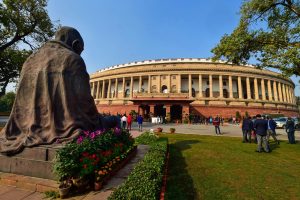
Lok Sabha passed the Institute of Teaching and Research in Ayurveda Bill which seeks to accord the status of an institution of national importance to a Jamnagar-based cluster of Ayurveda institutes.
- The Institute of Teaching and Research in Ayurveda Jamnagar will be granted an institution of national importance by conglomerating the cluster of Ayurveda institutes at the Gujarat Ayurveda University campus in Jamnagar.
- The three institutes which would be clubbed are Institute of Post Graduate Teaching and Research in Ayurveda, Gulabkunwerba Ayurveda Mahavidyalaya, and Institute of Ayurveda Pharmaceutical Sciences.
6.Small Farmers’ Agri-Business Consortium (SFAC):
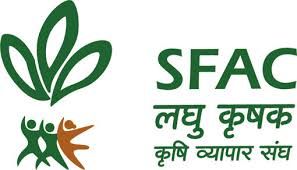
Agricultural and Processed Food Products Export Development Authority (APEDA) has signed an MoU with the Small Farmers Agribusiness Consortium (SFAC) to have better sync with their activities for the benefit of farmers.
- As per the MoU, both organizations will work towards capacity development, outreach programs, awareness programs and workshops of various stakeholders.
- APEDA will facilitate the certification of organic produce/areas by the FPCs assisted or identified by SFAC.
Significance of this approach: - It is expected that with the approach of joint collaboration with the organizations like SFAC, APEDA will be able to reach to a large farmer base for improving the production base of Agri products quantitatively and qualitatively both for maintaining the consistency of supply and establish an image of a quality supplier in the international market leading to increase in export volume and value and indirectly contribute to doubling of farmers’ income.
SFAC:
- The Government established Small Farmers’ Agri-Business Consortium (SFAC) as a Society in January 1994 to facilitate agri-business ventures by catalyzing private investment through Venture Capital Assistance (VCA) Scheme in close association with financial institutions.
- The role of State SFACs is to aggressively promote agribusiness project development in their respective States.
- The Society is governed by the Board of Management which is chaired, ex-officio, by Hon’ble Union Minister for Agriculture and Farmers Welfare as the President and the Secretary, Department of Agriculture, Cooperation and Farmers Welfare, Government of India, is the ex-officio Vice-President.
7.School Health Programme:
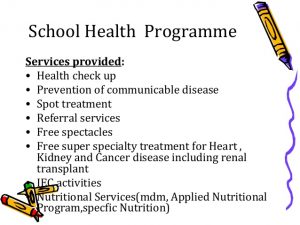
Recently, the Ministry of Human Resource Development (HRD) informed the Rajya Sabha about the implementation of the School Health Programme (SHP).
- The School Health Programme (SHP) under Ayushman Bharat was launched in 2018 by the Prime Minister in Bijapur, Chhattisgarh.
- It is a joint collaborative program of the Ministry of Health and Family Welfare and the Ministry of Human Resource Development.
- The initiative targets both Education and Health and intends to facilitate an integrated approach to health programming and more effective learning at the school level.
- Under the program, teachers act as “Health and Wellness Ambassadors” and disseminate various key information by organizing culturally sensitive activity-based sessions for one hour per week for 24 weeks in a year to promote joyful learning.
- Further, the students act as Health and Wellness Messengers in society. And every Tuesday is dedicated to Health and Wellness Day in the schools.
Objectives:
- Awareness about age-appropriate information about health and nutrition to the children in schools.
Detection and treating diseases early in children and adolescents including identification of malnourished and anemic children. - Usage of safe drinking water in schools.
- Promotion of safe menstrual hygiene practices by girls.
- Promotion of yoga and meditation through Health & Wellness Ambassadors.
- Encouragement for research on health, wellness and nutrition for children.
8.National Disaster Response Force:
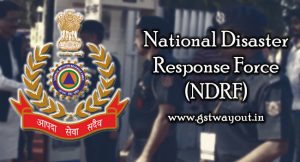
The National Disaster Response Force (NDRF) has trained more than 15,000 staff deployed at the air and land ports across the country on the protocols to be followed in view of the COVID-19 outbreak.
- The Disaster Management Act has made the statutory provisions for the constitution of the National Disaster Response Force (NDRF) for the purpose of specialized response to natural and man-made disasters.
- Two national calamities in quick succession in the form of Orissa Super Cyclone (1999) and Gujarat Earthquake (2001) brought about the realization of the need of having a specialist response mechanism at the National Level to effectively respond to disasters.
- This realization led to the enactment of the DM Act on 26 Dec 2005.
ROLE OF NDRF:
- Specialized response during disasters.
- Proactive deployment during impending disaster situations.
- Acquire and continually upgrade its own training and skills.
- Liaison, Reconnaissance, Rehearsals and Mock Drills.
- Impart basic and operational level training to State Response Forces (Police, Civil Defence and Home Guards).
Community Capacity Building Programme. - Organize Public Awareness Campaigns.
9.World Sparrow Day:
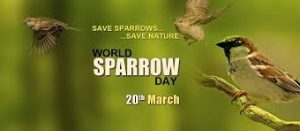
20th March is being observed as World Sparrow Day with the theme “I LOVE Sparrows”
- Every year March 20 is observed as World Sparrow Day to raise awareness about the bird.
- The need for marking this day was felt due to the tremendous decrease in its population. The house sparrow is on the verge of extinction.
- The initiative was started by Nature Forever Society (NFS) of India, founded by Mohammed Dilawar, an Indian conservationist. He started his work helping the house sparrow in Nashik. He was also named one of the Heroes of the Environment for 2008 by Time magazine for his efforts.
- The first World Sparrow Day was celebrated in 2010 in different parts of the world.
- Increased use of pesticides, change in the pattern of buildings and gardens missing from the houses are the main threats.
- Also, the radiation from the mobile and the TV towers has also been a cause of the death of sparrows.
- Birds navigate by sensing the earth’s magnetic fields and mobile radiations are known to disturb them and interfering with bird’s ability to move around.
10.Janta Curfew on Sunday, March 22.:

Prime Minister Narendra Modi addressed the nation and called for a Janta Curfew on Sunday, March 22.
- He said this curfew will be “for the people and by the people of India” and will be from 7 am to 9 pm on Sunday.
- PM Modi said it will apply to everyone and urged all citizens to stay inside their homes. He said those in emergency and essential services should do their regular duties.
- PM Modi urged the entire nation to stay at home for the coming few weeks to arrest the spread of the coronavirus pandemic. He said senior citizens aged over 65 years should stay indoors at all costs for the next few weeks.
- Section 144 of the Criminal Procedure Code (CrPC) of 1973 authorizes the Executive Magistrate of any state or territory to issue an order to prohibit the assembly of four or more people in an area.
- Restriction under Section 144 is different from the curfew. In the areas where curfew is imposed, all public activity is barred.
- Civilian traffic is also stopped. Curfew warrants much graver situation posing a bigger danger of rioting and violence.
11.Huntington Disease:

The National Centre for Cell Science has found that the pathogenic protein called the Huntingtin Protein causes a decrease in overall protein production.
- The disease is a genetic disorder that declines cognitive abilities, impairs coordination of balance and movement, memory lapses, mood swings, and personality changes.
- The disease is caused due to the mutation of the gene called HTT.
- The major function of these genes is to produce a protein called Huntingtin.
- A normal gene gives the right instruction to produce these proteins.
- A mutated gene gives faulty instructions. This disrupts the normal functioning of the brain and results in Huntington disease.
12.National Policy on Skill Development:
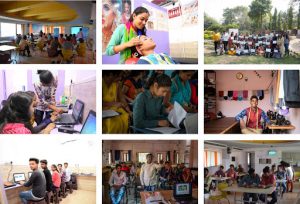
Ministry of Skill Development and Entrepreneurship presented the update on National Policy on Skill Development in Rajya Sabha
- The following initiatives have been taken under the policy by the Ministry since 2015
- The Pradhan Mantri Kaushal Vikas Yojana was launched under the policy. It provides short term skill training to the youth.
- SANKALP-Skills Acquisition and Knowledge Awareness for Livelihood Promotion. It is a project supported by the World Bank. It focuses on apprenticeship training and supports ITIs.
- Sector Skill Councils were set up under National Occupation Standards.
- The Councils aim at improving the productivity of workers and reduce their skill gaps.
- STRIVE-The Strengthening for Industrial Value Enhancement scheme was launched under the policy. It aims to improve the skills of workers through industrial training institutes.
- The Policy was launched in 2009 and was upgraded in 2015.
- The Policy aims at providing an umbrella framework that will link skills and demand.
Other important current affairs:
1. The Supreme Court has rejected a bunch of pleas seeking exclusion of creamy layer or better-off individuals among Scheduled Castes (SC) and Scheduled Tribes (ST) communities at the entry-level when it comes to the reservation in promotions.
- The court observed the pleas were an attempt by the petitioners to challenge the actions of the Karnataka government taken pursuant to a law, which was already held to be valid by the top court in 2019.
- The applications were filed in the BK Pavitra case in which the top court had, in 2019, upheld the constitutional validity of the Karnataka Extension of Consequential Seniority to Government Servants Promoted on the Basis of Reservations (to the Posts in the Civil Services of the State) Act.
- The Supreme Court in its 2019 judgment had held that the Act was a valid exercise of power by the government under Article 16 (4A) which empowers the state to provide reservations to SC/STs in matters of promotion.
2. Union Minister for MSMEs informed the Rajya Sabha that the government would come out with a new definition of MSMEs, which are currently defined on the basis of investment in plant and machinery, by the end of the ongoing session.
- The government has accepted 39 suggestions by the K. Sinha committee on MSMEs appointed by the Reserve Bank of India, including setting up a “fund of funds” for the sector.
- The MSME sector currently contributed 24% of the GDP growth and 48% of exports, with an annual turnover of ₹1 lakh crore this year.
- A target of ₹5 lakh crore in five years had been set.
- Among the hurdles before the sector was the pending payments by governments and public sector undertakings, which were ₹5.5 lakh crore to ₹6 lakh crore. These dues needed to be cleared in order to boost the sector.
3. As per the Key World Energy Statistics 2019, India is the 3rd largest producer of electricity in the world.
India was 106th in terms of per capita consumption in 2017.
- With a generation of 1,497 Terawatt-hour (TWh), India is the third largest producer and the third largest consumer of electricity in the world after the US and China.
- Although power generation has grown more than 100-fold since independence, growth in demand has been even higher due to accelerating economic activity.
- Electricity is also one of the eight core industries of India.
- Electricity use and access are strongly correlated with economic development.
4. Researchers at IIT-Bombay are using biologically active lipid molecules as chemical biology tools to understand their biological disease-causing function.
- Researchers are using lipids from Mycobacteria tuberculosis (Mtb).
- Lipids are molecules that contain hydrocarbons and make up the building blocks of the structure and function of living cells.
- The role of lipids in critical mechanisms involved in host-pathogen interplay is being explored.
- The mechanism of action of Mtb lipids on human host membrane and related cellular events represents a golden opportunity to deepen the understanding of the function of Mtb lipids in membrane-dictated bacterial survival, pathogenesis, and drug resistance.
- Scientists are also investigating the role of Mtb lipids in drug-membrane interactions, underscored by the fact that lipids critically dictate the molecular interactions of drugs with membranes influencing drug diffusion, partitioning, and accumulation.
5. The British government apologized for the Windrush scandal i.e. its treatment of Britons of Caribbean origin, who were wrongly detained or deported for being illegal immigrants, after the publication of a devastating official report.
- Windrush generation refers to migrants from the Caribbean Commonwealth who had come to the U.K. at a time when they had the right to remain indefinitely in Britain but had had their rights questioned under a toughened immigration regime.
- The Windrush generation is named after one of the many vessels that ferried some half a million people from the Caribbean islands to the U.K. in the late 1940s.
6. Prices of Alcohols used in manufacturing hand sanitizers have been capped under the Essential Commodities Act, 1955.
- In view, the ongoing outbreak of COVID-19, prices of the alcohol used in manufacturing the hand sanitizers have been exorbitantly increased by the producers of such alcohol.
- Therefore, the Government has notified an Order under the Essential Commodities Act to declare price cap prevailing on the alcohol used in manufacturing the hand sanitizers.
- States can now ask the manufactures of these alcohols not to increase the prices of their products without the concurrence of the Central Government.
- The States have also been advised that the existing manufacturing units of alcohol-based sanitizers be encouraged to increase their capacity. Ministry of Environment has allowed an increase in capacity by 50% without further environment clearances.
7. The National Aquifer Mapping and Management program (NAQUIM) is being implemented by the Central Ground Water Board (CGWB).
- NAQUIM envisages mapping of aquifers (water-bearing formations), their characterization and development of Aquifer Management Plan to facilitate the sustainable management of groundwater resources.
- NAQUIM was initiated as a part of the Ground Water Management and Regulation Scheme to delineate and characterize the aquifers to develop plans for groundwater management.
8.India-US Science and Technology Forum (IUSSTF) was established under an agreement between the Governments of India and the United States of America in March 2000.
- It is an autonomous bilateral organization jointly funded by both the Governments that promote Science, Technology, Engineering, and Innovation through substantive interaction among government, academia, and industry.
- IUSSTF’s vision is to ensure excellence in Science, Technology and Innovation space through collaborative initiatives between India and the United States of America.
- Its mission is to act as a catalyst to promote long-term scientific collaborations between India and the U.S. through partnerships amongst individual scientists, scientific institutions and the scientific community at large.
- The Department of Science & Technology (DST), Governments of India, and the U.S. Department of State are respective nodal departments for this program.
9. The Green Companies (GreenCo) Rating System has been developed by the Confederation of Indian Industry (CII).
The system evaluates the companies on 10 broad green parameters, including GreenHouse Gases (GHG) reduction, renewable energy use, etc.
- Accordingly, ratings are provided which remain valid for three years.
- It is the “first of its kind in the world” holistic framework that evaluates companies on the environmental friendliness of their activities using a life cycle approach.
- The life cycle approach considers product design, materials used, procurement, vendor management, logistics, packaging, manufacturing, distribution, product use, disposal, and recycling.
- Its mission is to facilitate the Indian industry to make a substantial improvement in their environmental performance thereby saving both natural and financial resources.
- It has been acknowledged in India’s Intended Nationally Determined Contribution (INDC) document, submitted to the United Nations Framework Convention on Climate Change (UNFCCC) in 2015, as a proactive voluntary action of Indian industry/ private sector towards combating climate change.
10. The Small Industries Development Bank of India (SIDBI) announced Swavalamban Express.
- The Train is to visit 11 entrepreneurial cities.
- This includes Delhi, Jammu, Mumbai. Ahmedabad, Hyderabad, Bengaluru, Kolkata, Bhubaneswar, and Varanasi.
- During the period, various workshops and programs are to be organized.
- The train has been launched to fulfill India’s goal of 5 trillion USD by 2024-25.
11. The government of India has notified rules to avail full benefit of direct tax dispute resolution under the Vivad Se Vishwas Scheme.
- Currently, there are more than 400,000 cases that are eligible to avail of the scheme.
- This involves Rs 9.3 lakh crores.
- The scheme aims to settle disputes and aid in revenue collection of the Government. However, experts believe that under the COVID-19 crisis, it is essential to extend the date of deposit date beyond March 31.
- The scheme was introduced by the Finance Minister during the Union Budget 2020-21.
- The scheme aims to settle pending cases on direct taxes.
- It provides a waiver of interest to those taxpayers that pay their taxes before March 31.
12. The Finance Commission announced that it will monitor the situation of COVID-19 before releasing its second report.
- The Commission is to set up a committee to review the fiscal consolidation of the government.
- The commission has recommended grants for the health sector under its report. It has recommended setting up of State Disaster Risk Management Fund and National Disaster Risk Management Fund.
- This will replace the existing Disaster Relief Funds both at the centre and state levels.
- This is being done to give larger priority to disaster management, mitigation, relief, and response.
13. On March 20, 2020, four convicts of the Nirbhaya Gang Rape were hanged to death in Tihar Jail.
- In September 2013, a fast track court convicted them with a death sentence.
- Several curative and mercy petitions were filed by them at the Delhi High Court and Supreme Court.
- In 2017, the Supreme Court upheld the death penalty. Recently, in 2020, the Supreme Court refused to take in the petitions.
- Article 145 of the constitution allows the Supreme Court to frame its own rules. Under the Article, the SC rules its own proceedings, cases handled by it, transferred to high courts, etc.
- It has powers to stay proceedings, grant bail, allocate a number of judges to sit in a bench, etc.
- With this power, the apex court refused to consider the petitions of the accused.




